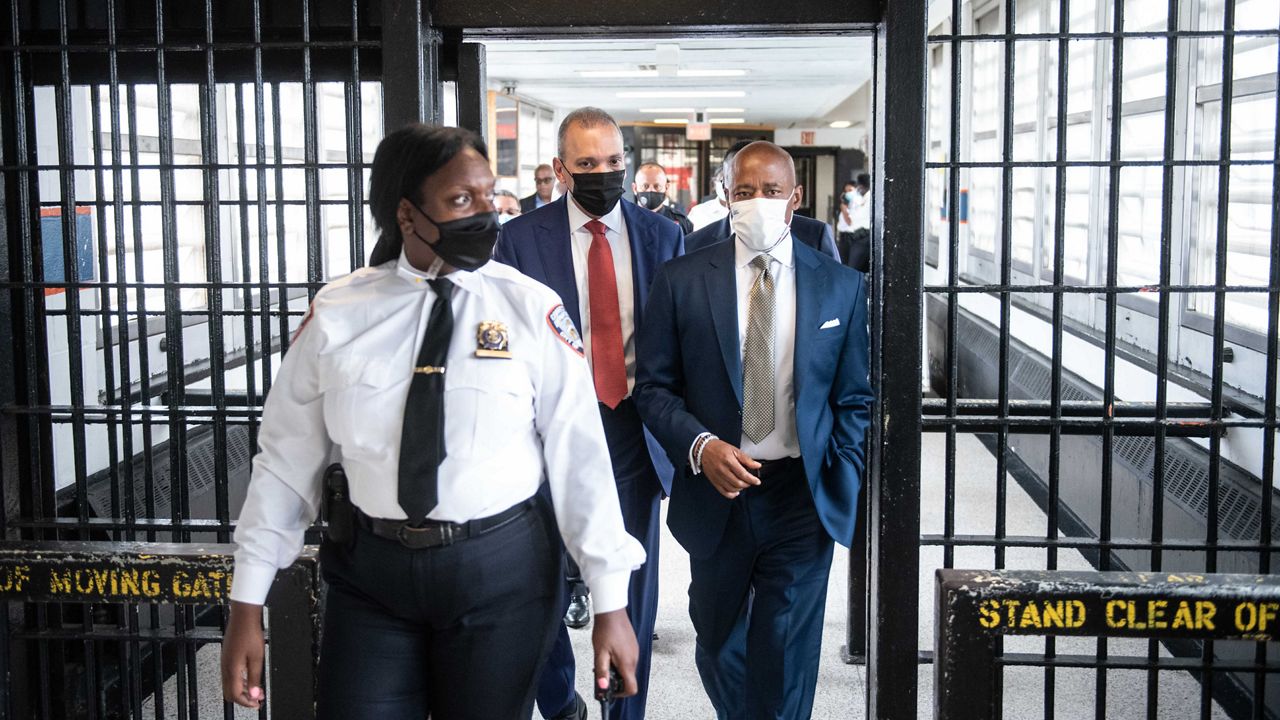City Council members pressed the city’s jails chief over treatment of transgender inmates and transparency issues in a hearing Wednesday.
The two sides clashed on several issues. Council members pushed Department of Correction Commissioner Louis Molina on whether the department is refusing to place transgender inmates in units that fit with their gender identity due to their criminal or disciplinary records. They also asked Molina to justify limiting public access to its policies on transgender inmates and to its security footage.
In one exchange, council members asked whether Molina would share a document that outlines how it determines placements for transgender, nonbinary and gender-nonconforming inmates, who must apply to be housed in their preferred unit.
At first, Molina cited security concerns in not making the document public. But when asked later to give an example of a rationale for keeping the document internal, he said he could not “at this time,” and said he would send a reason by the end of the day.
Councilwoman Tiffany Cabán, who co-chaired the hearing, said she was “a little bit blown away by that.”
“It is deeply disturbing, coming in knowing what the topic of today’s hearing would be, and you're unable to articulate one reason supporting a really consequential policy that your department has taken,” Cabán said.
The hearing featured discussion of legislation proposed by council members on treatment of non-cisgendered people.
One bill would allow the Board of Correction, an oversight body, to hear appeals on its housing decisions for such inmates during the intake process.
Molina suggested he did not support the bill, saying that intake decisions should remain under his department’s purview.
The correction department has faced rising scrutiny over its treatment of inmates, as its total population in custody has risen to nearly 6,000, according to Molina — and as deaths in city jails hit a record high for this century last year, at 19.
The department was once considered a leader in addressing the needs of transgender inmates, creating the first unit dedicated to that population in 1979. Yet it has been the subject of intense criticism over its treatment of transgender individuals in particular since 2019, when Layleen Polanco, a transgender woman, died after having seizures while held in solitary confinement on Rikers Island.
In a lengthy report released last summer from a task force convened by the Board of Correction, numerous transgender people who have been held in city jails said the system was failing them. The report found that transgender inmates faced assaults when placed in units that did not align with their gender identity, and that transfer to such a unit was sometimes held over the inmates’ head as a punishment for not following certain rules.
Currently, the department has 50 known transgender people held on the Rikers Island jail complex, Molina said. Of those, 38 are housed in their preferred unit. The remaining 12, Molina said, are housed in special custody areas or units for people experiencing mental health struggles.
In 2022, he said, the department’s Special Consideration Unit (SCU), which looks at housing applications from transgender, nonbinary and gender-nonconforming inmates, approved 75% of requests.
The SCU sometimes denies applications for security reasons, or, in some cases, because they believe the applicant is trying to game the system, Molina said.
“On rare occasion we have information from the applicant themselves that they may just be trying to get into a preferred housing unit, and (that their application) doesn't have anything to do with their preferred gender identity,” he said.
Inmates must wait 90 days to appeal the SCU’s decisions, Molina said, which take into account criminal and disciplinary history.
“All of those things are security classification information pieces that go into making that decision, yes,” he said.
Cabán, in her questioning, suggested that the SCU’s process was discriminatory, pointing to state laws that prevent cisgender women from being housed in men’s jails. She asked what would happen if the SCU rejected a transgender woman’s application to be housed in the Rose M. Singer women’s jail, known colloquially as Rosie’s.
“Those 90 days, they could be stuck in a men's jail before going back to Rosie’s?” she asked.
“They could be,” Molina said.
Councilwoman Carlina Rivera, who co-chaired the hearing with Cabán, pressed Molina on his decision to revoke real-time access of security footage from the Board of Correction. The decision came after NY1 published body-worn camera footage it received from the board as part of an investigation into one man’s death by suicide on Rikers in October.
Molina said the decision was meant to bring the department into compliance with the city charter, but did not offer a reason for the timing of the change. Board of Correction members will now have to go to one of several city office locations during business hours to view the footage.
Molina said that when he took over leadership of the department in January 2022, he was “highly disturbed” to learn that the board had not visited Rikers during the pandemic.
The board “chose to stay home and work remotely and just collect a paycheck while uniformed and non-uniformed staff came in every day to manage a very vulnerable population during a global pandemic,” he said.
Following Molina’s testimony, members of the taskforce that compiled last year’s report on treatment of transgender inmates spoke, often criticizing Molina’s responses and saying that the department was not engaging with any of its policy recommendations.
Deborah Lolai, a public defender at Bronx Defender Services, questioned why Elizabeth Munsky, the executive director of the correction department’s LGBTQ+ Affairs Unit, did not appear at the hearing. An investigation by NY1 newsroom partner The City found this week that the unit has been hollowed out under Molina’s leadership.
“Why didn't they have her testify today?” Lolai said of Munsky. “She would have been able to answer all of your questions, I’m sure.”
The Department of Correction did not immediately respond to a request for comment on Munsky’s absence.



